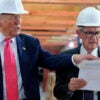In January, the Department of Commerce delivered a report to the president on the effects of steel imports on U.S. national security. That report went public earlier this month.
In the report, the Commerce Department made a series of recommendations to restrict imports. Those recommendations ranged from imposing tariffs of up to 53 percent to establishing global quotas based on 2017 import levels.
The 262-page report focused almost exclusively on integrated steel mills, which represent only one-third of domestic steel production. It failed to mention the adverse effects of tariffs on steel-using industries in the U.S.
Domestic steel-using industries employ roughly 17 million Americans—6.9 million in manufacturing and 10.1 million in construction. These jobs rely on steel products as inputs, and any trade restrictions will increase the price of those goods.
It is imperative President Donald Trump evaluate the potential negative consequences that tariffs will have on U.S. manufacturers, like the tooling and machining industry, gear and wire producers, and industrial fastener manufacturers. The last set of tariffs on steel, imposed in 2002 by President George W. Bush, resulted in 200,000 Americans losing their jobs because of higher steel prices.
>>> Read the full report, “President Should Reject Flawed Commerce Report on Steel Tariffs”
In a letter to the president, a group of steel-using manufacturers indicated that the tariffs being considered could have consequences similar to those experienced in 2002. They write:
Restrictions on basic steel imports will actually adversely impact national security, the economy, and the steel industry itself because it will undermine our competitiveness and limit our ability to make value-added products here. In that event, these products will be made elsewhere, resulting in lost business and jobs for our members and reduced purchases from the domestic basic steel industry. Everyone in the U.S. steel supply chain will be damaged by restrictions on steel imports.
The president will make the final call on whether or not to impose trade restrictions on steel. The deadline for his decision is April 11. With this many manufacturing jobs on the line, the president should think twice about imposing tariffs and other anti-trade barriers.
































